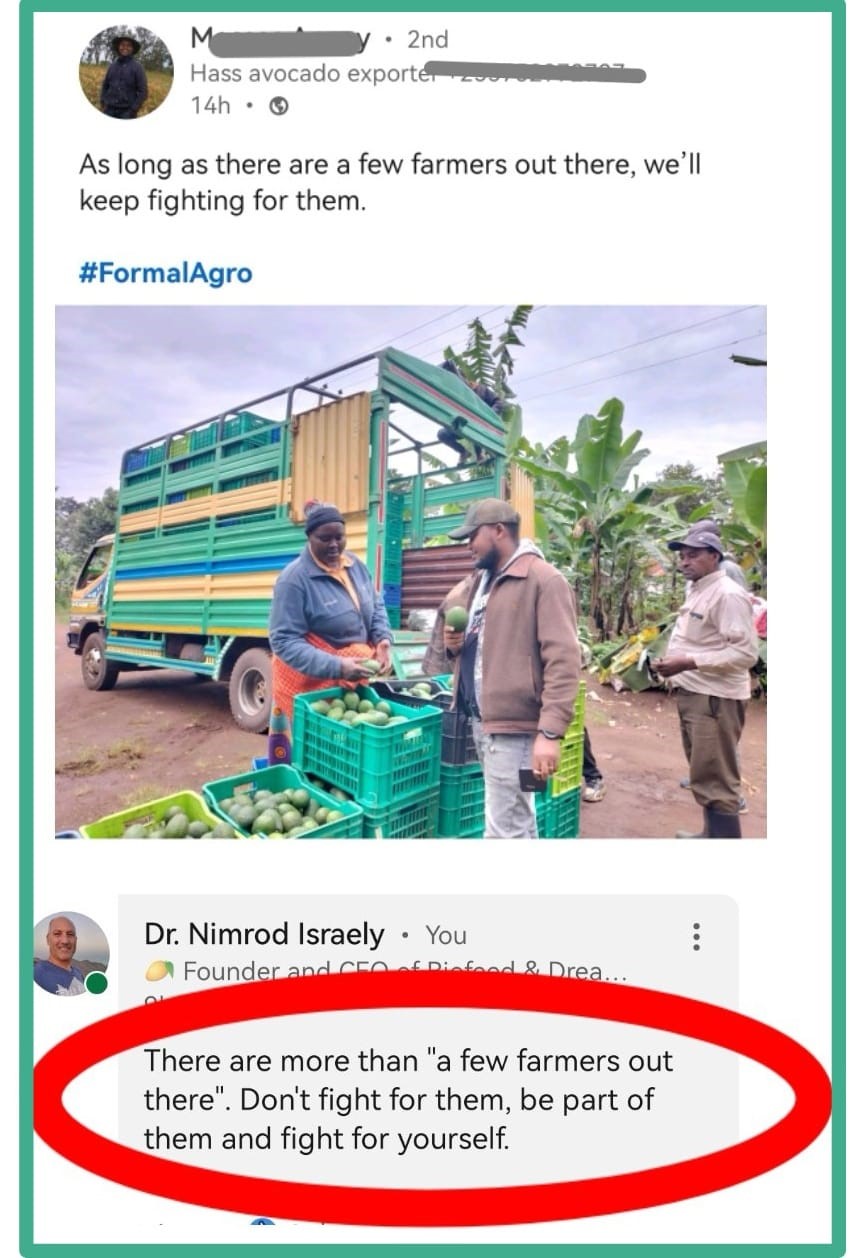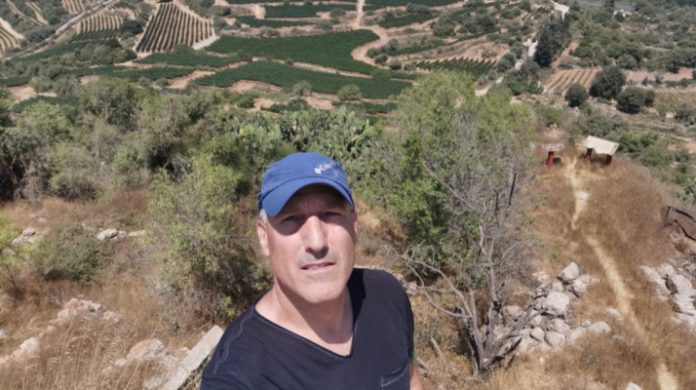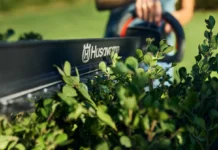By: Nimrod Israely is the Founder and CEO at Biofeed Ltd
A few days ago, I saw a trader’s post on LinkedIn, saying, “As long as there are a few farmers out there, we’ll keep fighting for them.”
JEWISH TRADITION
Note that the trader relates to the farmers as “them.” Why? Because he is not part of “them” and hence unaffected by whatever happens to them.
In the context of the Israelite slavery in Egypt, the Jewish tradition speaks of “four sons – one who is wise, one who is wicked, one who is simple, and one who does not know to ask.”
According to the tradition, each son asks a question. The wicked son’s question is, “What is this service (work) to you?”
By saying “You,” the Jewish tradition views the wicked son as isolating himself from the other people, standing, watching their behavior rather than participating. (Wikipedia)
The Jewish tradition expects you not to watch and isolate yourself from other people but to participate and act to improve their situation.
When I wrote my comment to the trader’s post, I didn’t think of this, yet, I sensed the awkwardness of the trader using the word them.
ILLUSIONS OF UNDERSTANDING
The above discussion of THEM versus WE relates to my previous column where I spoke of empathy and the need to understand the other better.
I wrote, “When I understand the other, I change, and when I change, I can change the other. Change starts from within”
The above sentence is perfectly correct but has a notable Achilles heel. Did you recognize it?
The Achilles heel is obviously, “When I understand…”
We should ask, how can we know and be sure we understand the other? Is there a way of measuring the “level” of understanding?
We know we can never fully understand others, which explains why attempts to bring a CHANGE fail too often.
Here are some examples of statements that expose our misunderstanding to others. Have you heard some of them before?
* They don’t understand anything I/we explain.
* I explain, but they don’t get it.
* They are stupid / hopeless / irrational.
* We try to help them, but they act against their own good.
I have heard those phrases and others like them many times, and too often from experts and officials.
This is sad, as we should assume that “the other” is as wise and smart as we are.
Hence, if the other is acting “irrational,” we should conclude that we do not understand them deep enough!
If the other seems “irrational,” it is our task to improve our understanding. The more we understand, the more we can help.
THE THINGS THAT MATTER
We were sitting in a circle under a huge tree, as those “meeting trees” always are. I am on one side of the circle, and the farmers in a crescent in front of me.
After over an hour, the atmosphere is friendly, positive, and pleasant.
As the meeting reaches its end, the atmosphere becomes tense. Then the farmers’ leader addresses me;
“Thank you for coming and talking with us. We appreciate it. We heard well what you said, and we love it. We are glad to have met you, and thank you for coming this far. We want to be a part of Dream Valley and are willing to do whatever it takes. We believe in you and are sure that what you presented is the future. We want to have a part in this future.
Before we continue, we need to close the issue of the price per kilogram. You see, the other traders promised us 300 per kilogram, in addition to paying an advance.
How much will we get from you per kilogram, and how much from it will we get in advance? “

I smiled, for I knew there was no way the meeting would be over without discussing prices.
Me – How many years have you been working with these merchants?
Farmers – For many years.
Me – To what extent have these traders helped you promote and increase the quantity and quality of the fruit? How much has the income per hectare increased in the last decade?
Farmers – The income did not increase; it fell by more than 50%.
Me – The traders promised you 300, but how much do they actually pay?
Farmers – In the middle of the season, 150 (half) and 100 (third) at its end. Sometimes they don’t come to collect the fruits, and then we get zero.
Me – Now, working with those traders, what percentage of the fruit do you lose because of fruit flies?
Farmers – More than 50%, and during the rainy season, 80% to 100%.
Me – Have the dealers ever helped you with professional advice or machinery?
Farmers – NO!
Me – What is more important: The price per kilogram or the total income, in your pocket, at the end of the season?
Farmers – Of course, we mostly care how much money we have at the end of the season.
After a few more questions, I paused. Then I looked them in the eye and said –
I did not come here to compete with this or that trader. I am not a dealer. I am here to help you improve your livelihood by together improving your business results.
The dealer with whom Dream Valley works will offer you a price, and I suggest you take it even if it is lower than that of the other traders.
Remember that to date, fruit fly infestation at farmers’ orchards working with us has dropped from 50% to less than 1%!
Those farmers were able to sell many more fruits of superb quality. I trust it will be the same with you.
When working with Dream Valley and protected by the Freedome and the Fruit Fly Certified Trade Zone (FFCTZ), you will no longer be afraid of the fruit flies.
You could wait with the fruit harvest, have an extended season, let the fruits grow in size and weight, and turn colorful and tastier.
Thus, you will have more kg of better quality produce; hence, you can even get a premium price.
All of this can practically double, and more, your annual income.
As to advances, the products (Freedome) and the protocol (FFCTZ) that we will implement in the coming week at a nominal price, and in this season for free, are worth ten times more than the traders’ advances.
You see, even before I receive one fruit from you, we will invest in education, equipment, service, and other activities to improve the quality and quantity of your fruits.
Now, please tell me, which dealer did this for you?
Moreover, the traders you work with today are not interested in the condition of your plantation before and after harvest.
If you have quality fruit, they will buy it; if not, then no. Their future is not linked, dependent, or related to yours.
At Dream Valley, we decided to tie our future to yours. Most of our income is from a commission we get from selling your produce. When you have a lot of high-quality produce, you are happy, and so do we.
After so much investment, we may lose if we don’t sell a lot of high-quality produce.
Now you know, our motivation is aligned with yours – to sell as many quality fruits as possible for premium prices and help you have even more next year.
You see, my company’s future and mine are tied with yours.
Is there a trader whose future is tied with yours and is committed to helping you on an ongoing basis?
Do the traders you know help you increase your yield and quality, and consequently your income and livelihood, so you can fulfill the dreams you told me about earlier?
It is time for you to decide whether to continue as it has been for the last 20 years or embark on a new path and change for a better future.
The farmers began a discussion among themselves in their native language. I sat and waited.
The discussion was short. They lifted their hands, voted, and unanimously reached a decision.
Then they turned to me and announced that everybody wanted to participate in the Dream Valley program.
They smiled, and I smiled. From this moment and on, it was no longer THEM versus ME. Now it turned into US working together for a better future. We got up, shook hands, and then said goodbye.
IMMERSE YOURSELF
We often fool ourselves into believing we understand others when reality shows it is not so.
Is there a way to mitigate the “understanding illusion”?
Yes, there is, at least partially.
If you follow the process, I went through with the farmers, as described above and in previous columns, you can see that I am using several stages to ensure my continuous understanding of the farmers. Here are two of those critical stages.
STAGE ONE – BEFORE THE DEAL
Increasing mutual empathy.
* I meet the farmers in their village.
* We sit and talk at length.
* I ask them questions.
* I listen to them carefully.
* I show that I care about them.
* I share with them my personal story as a farmer.
Remark: philanthropists, subsidies, NGOs, gifts, and present givers risk nothing, as they expect to give and get nothing in return. Hence, the understanding of those of the farmers is limited, and so is their ability to CHANGE.
STAGE TWO – THE DEAL
The novel business model ensures an alignment of interests of the parties – both parties will benefit/lose together.
Anything that was not well enough understood in Stage One will result in losses to one or both parties and may cause the deal to crash. This is the most profound Reality Check.
We turn from ME and YOU to US and WE in Stage Two.
This is the secret to a deep understanding of the other; you “vaccinate” yourself by making his problems and joys yours. That is why we decided that the Dream Valley model should share the upsides and downsides with the farmers.
As the saying goes, you put your money (risk) where your mouth is.
You can’t deepen your understanding of the other if a mutual risk is not involved.
Dream Valley created, operated, and implemented its model in the frame of creating a “shared motivation” mechanism.
This ensures mutual risk-taking with the farmers. Hence, Dream Valley ensures continuous, mutual “understanding.”
Remember that only those confident in their ability to generate increased income continuously will “take the risk” of developing a “shared risk” model.
In Stage Two of my meeting with the farmers, I shared with them the details of Dream Valley’s business model.
When the farmers saw that I understood them and was ready to take the risk with them, they didn’t hesitate and immediately joined the program, even if the promised price per kg was not the best they received.
Note to self, from 2017 to 2021, farmers participating in Biofeed and Dream Valley programs increased their income by over 50%, and often over 200% already in the first season.
It is a fact that Dream Valley’s business model, based on the Israeli model, works in Israel and now also in non-developed economies, with the necessary adjustments.
Are you ready for a New Deal with farmers, government, and the private sector, where ALL share the risk and the upsides?








